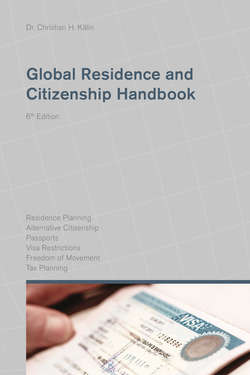Читать книгу Global Residence and Citizenship Handbook - Christian H. Kälin - Страница 32
На сайте Литреса книга снята с продажи.
1.5Tax residence: considerations and implications
ОглавлениеTo determine if a person should be subject to taxation, countries generally use the following criteria:
•Residence – a country may tax the income of anyone who lives there, regardless of citizenship or whether the income was earned in that country or abroad
•Source – a country may tax any income generated there, regardless of whether the earner is a citizen, resident, or non-resident
•Citizenship – a country may tax the worldwide income of their citizens, regardless of whether they reside in that country or not
For the internationally mobile, the tax position across different countries will be an important concern. But the amount of tax they pay is also of interest to the relevant tax authorities. The simple rule is, the more you pay, the more interesting it becomes – for both sides.
Most countries use residence and/or source criteria when determining if a person should be subject to taxation. The US, and to a lesser extent some other countries,7 are notable exceptions.
The place of residence for tax purposes or tax residence is therefore important in determining how you are taxed. If you have connections with, and spend long periods in, more than one country, there may be uncertainty about whether such connection or time spent in different jurisdictions does not make you tax resident in more than one place. The question of tax residence is very important for internationally active people, because getting it wrong can be expensive and time-consuming to resolve.
Other than the number of days spent in a country – which is perhaps the most important factor – a wide range of personal, business, property, economic and social connections must also be considered to determine ‘tax residence’.
In many countries, the laws and regulations are ambiguous, except for minimum thresholds (i.e. below a certain number of days of presence in the country – with anywhere between 10 and 90 days a year, you are generally safe and would normally not be deemed resident for tax purposes, depending on the country), and there is generally no clear guidance on the relevant weight of each factor.
Factors that can play a role include:
•Where your spouse lives (if you are married)
•Where your children live (if you have children)
•Where you have accommodation available for your use (i.e. where you own or rent homes)
•Whether or not you were tax resident in previous years
•Whether or not you carry out full-time work somewhere outside the country (i.e. you have a full-time job and workplace outside the country)
•Whether you are doing any work in the country (even if just a few days per year)
•Whether you spend more days in the country in any tax year than in any other single country
•What social ties you have in the country, memberships in clubs and societies etc.
By choosing a country with a mild tax climate for a main residence, a taxpayer can considerably reduce his burden legally and effectively without the need for complex tax planning. Belgium, Croatia, Hong Kong, Malta, Monaco, Singapore, St. Kitts and Nevis, Switzerland, and the UK, to name a few, are attractive destinations in this respect. So a change of residence may well be worthwhile not only as a lifestyle choice but also from the standpoint of taxation.
A move will either have tax advantages and tax savings or it can create a greater tax burden, depending on the jurisdiction. It is therefore imperative to establish the tax implications prior to changing residence. Interesting scenarios could arise that one would not ordinarily be aware of. Most sensibly, one should consult a tax advisor who is versed in the tax laws of both countries.
A trend which we see with tax authorities around the world is that they check not only how long you are resident in a particular country, but also whether you may be spending more days in their country than in any other single country. In other words, even if you spread out your presence globally across several jurisdictions, and say you are spending your year in six different countries with 80 days, 70 days, 60 days, 75 days, 10 days and 65 days in each, then it could be that the tax authorities of the country you spend 80 days could still deem you tax resident (in practice of course only if you have some other connection there), even if you are well below the normal threshold for that country but simply because you spent even less time elsewhere.
